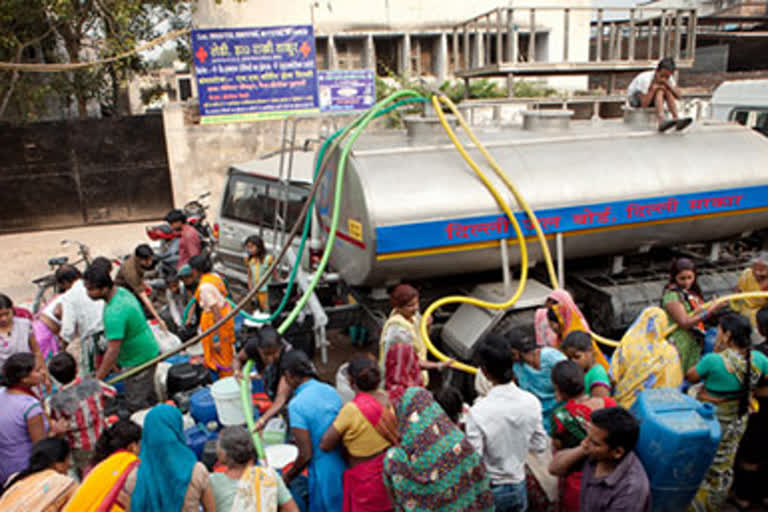New Delhi: The recent criticism of “rewari culture” (freebies) levelled by Prime Minister Narendra Modi has now been meeting with an increasing opposition attack on what they call as 'gajak culture'.
Modi seemed appealing to the conscience of all to debate the pros and cons of offering the freebies but the opposition, especially the Congress and the AAP, is not taking kindly to it. The rivals stepped up their attack on Modi after he remarked that some people and parties have become so ambitious that they may want to give free petrol and diesel, which, he said, is “not good for democracy”.
Modi sought to differentiate between free rewari culture and real welfare and said: “We need to be aware of political party leaders making such announcements." On its part, the Congress had questioned the Centre over the writing off of loans amounting to Rs 10 lakh crore and termed it as the "Gajak culture". Congress spokesperson Gaurav Vallabh also raised questions on the manner in which the BJP Government, based on the Food Security Act 2013, distributed free ration to 80 crore citizens during the corona epidemic.
Delhi Chief Minister and Aam Aadmi Party convener Arvind Kejriwal and his deputy Manish Sisodia also made unsparing attacks on the BJP for labeling welfare schemes as freebies. A plea was also filed in the Supreme Court against the distribution of freebies to woo the voters. It was also submitted that the distribution of gifts or making freebie promises should be declared as bribe. Ashwini Upadhyay, in his petition in the court, said such promises of political parties would prejudice free and fair elections.
Strongly defending its position, the Aam Aadmi Party (AAP) asserted that the welfare schemes cannot be called free gifts. There are Directive Principles of State Policy in the Constitution under which the states run social welfare programs, so that social balance is maintained in the country and every section can get basic facilities, the AAP argued. Through the welfare schemes, they are providing canteen facilities for food to poor workers at low cost, provision of night shelter, low cost or free water, basic health service, free education to children up to 14 years, free ration to those who cannot arrange food, mid-day meal, free transportation to women etc.
If a political party promises to provide laptops, computers or mobile phones, it will all come under the category of freebies even as giving cash directly is also a free gift. The AAP entered politics in the year 2013, when it contested the elections and promised waiver of electricity and water bills. The party was successful in forming the government. In 2014, the party won 67 out of 70 seats on the basis of freebies including up to 200 units of free electricity, water, WiFi, free pilgrimage to the elderly, surgery, free bus travel for women.
As the AAP schemes get greater patronage, other political parties are promising more free schemes ahead of the upcoming assembly elections in their states. The Delhi government, in 2020-21, spent Rs 1,900 crore on electricity bill subsidy. According to the figures for the month of March, there was zero bill for about 46 lakh people.
According to the data of the Delhi government for 2020-21, Rs 800 crore was spent on free drinking water scheme, which benefitted about 14 lakh people. Over Rs 108 crore was reportedly spent on free transport scheme for women. There are no figures of how many women have benefited from this scheme so far, but DTC claims there has been a 40 percent increase in the use of DTC buses by women.
Today 400 Mohalla Clinics of Delhi Government are running in the national capital for which the government has earmarked more than Rs 400 crore for the current year. For the Chief Minister Pilgrimage Scheme, senior citizens living in Delhi are enjoying free pilgrimage to 12 places. The Delhi government also runs free surgery scheme under which 1,100 types of operations can be done free of cost. Government hospital refers the patient to a private hospital which will do surgery for free under the scheme.
The Delhi government is also providing free WiFi at 11 thousand locations and free cleaning of septic tanks in needy colonies and villages. Under the Jai Bhim Mukhyamantri Pratibha Vikas Yojana, people from OBCs are also being brought under the purview of the scheme besides the children of SC category.
A report of the Reserve Bank of India said ever since the AAP came to power in Delhi, the expenditure on education and health services has increased. At the same time, Delhi's revenue deficit remains a matter of concern. To increase its income, the Delhi government brought a new excise policy last year and gave the responsibility of selling liquor to private companies. However, this policy has been withdrawn. Former Chief Secretary of Delhi Government Omesh Sehgal has said that the government's job is to build roads, schools, flyovers and if the government continues to provide electricity and water for free, then they will have to cut on other welfare schemes.
Also read: Kejriwal promises free education if AAP elected to power in Gujarat



